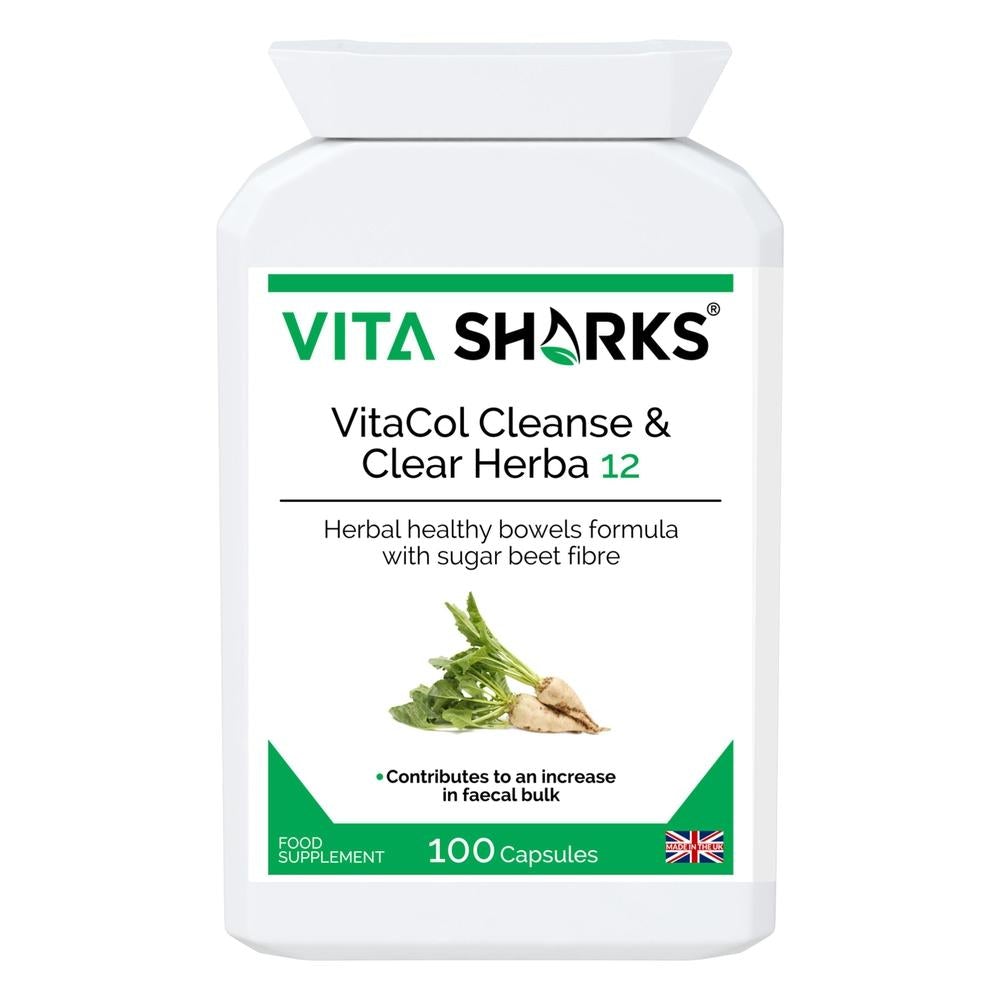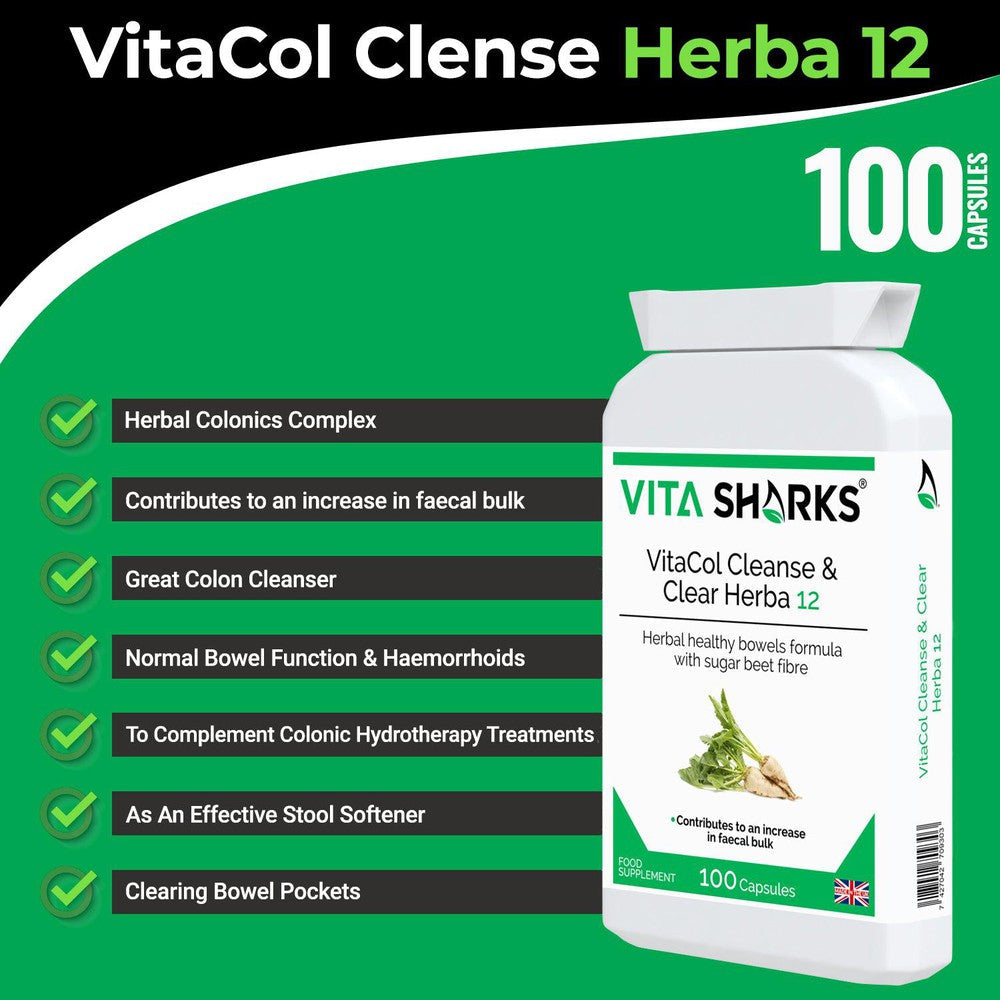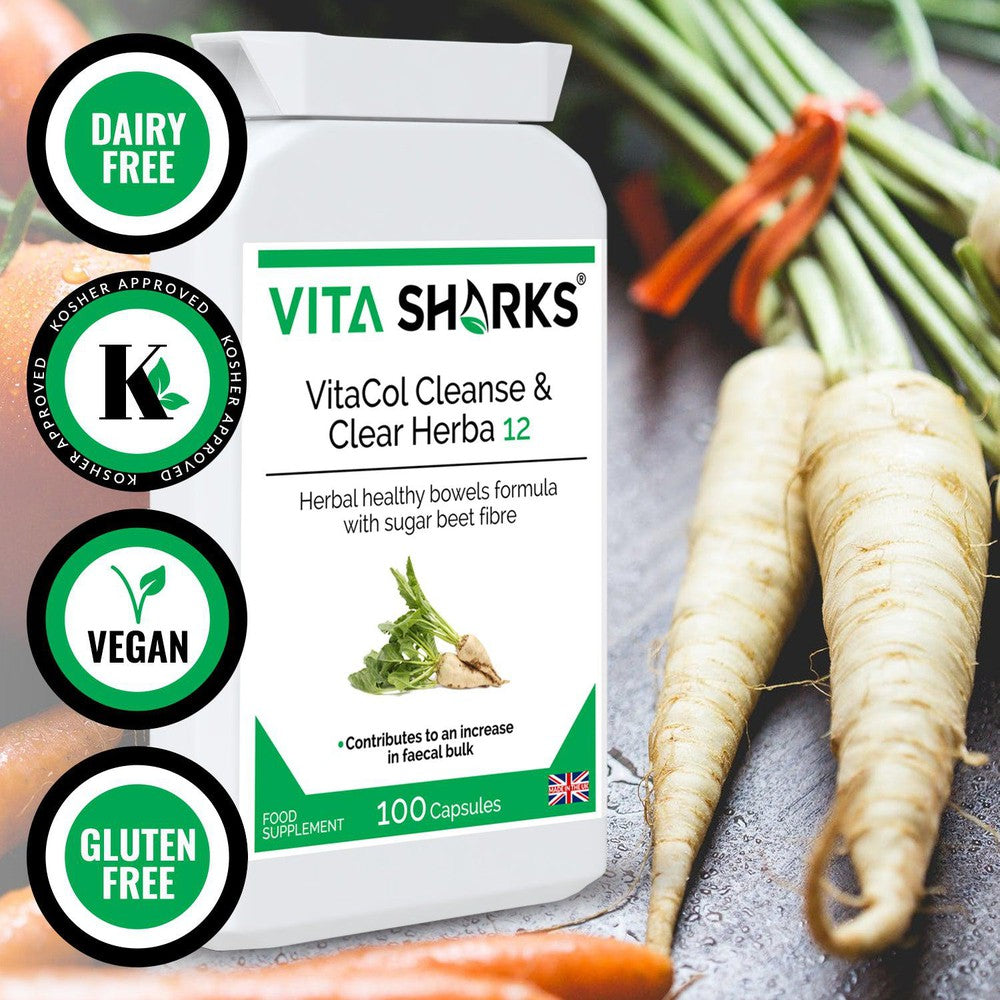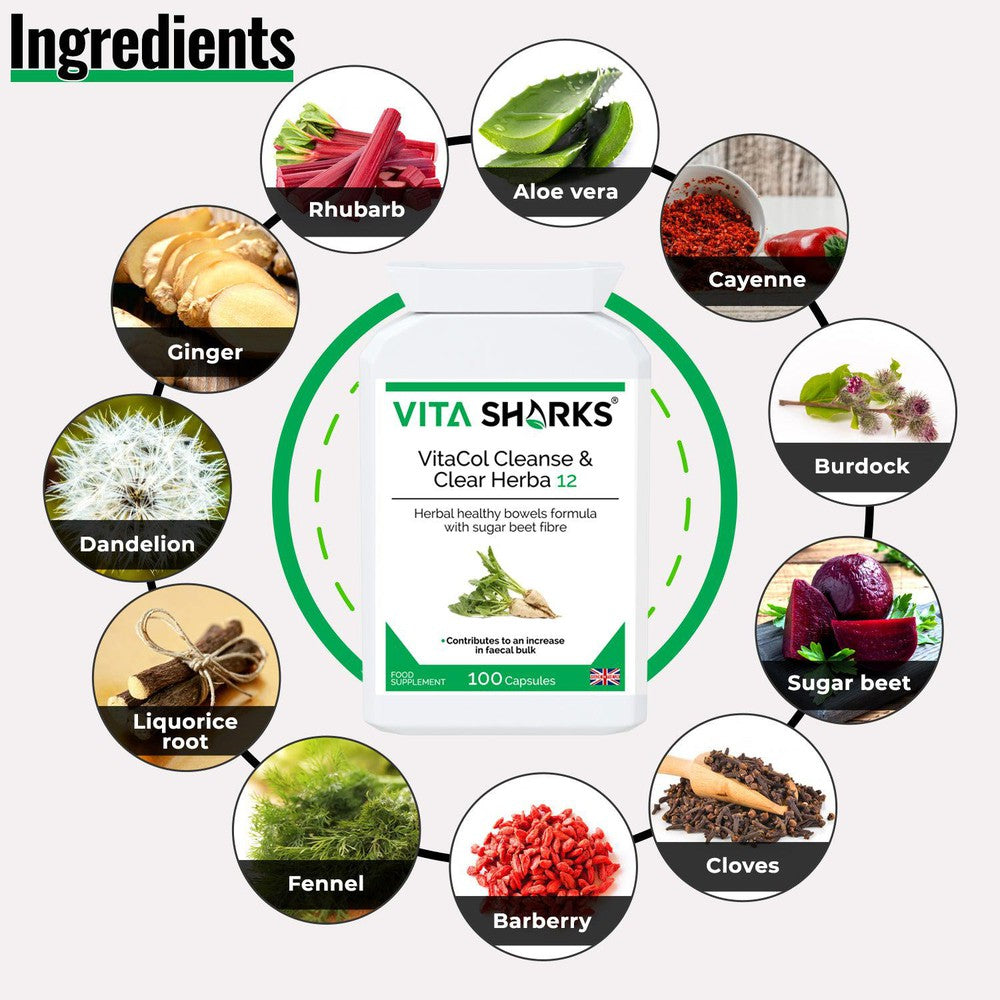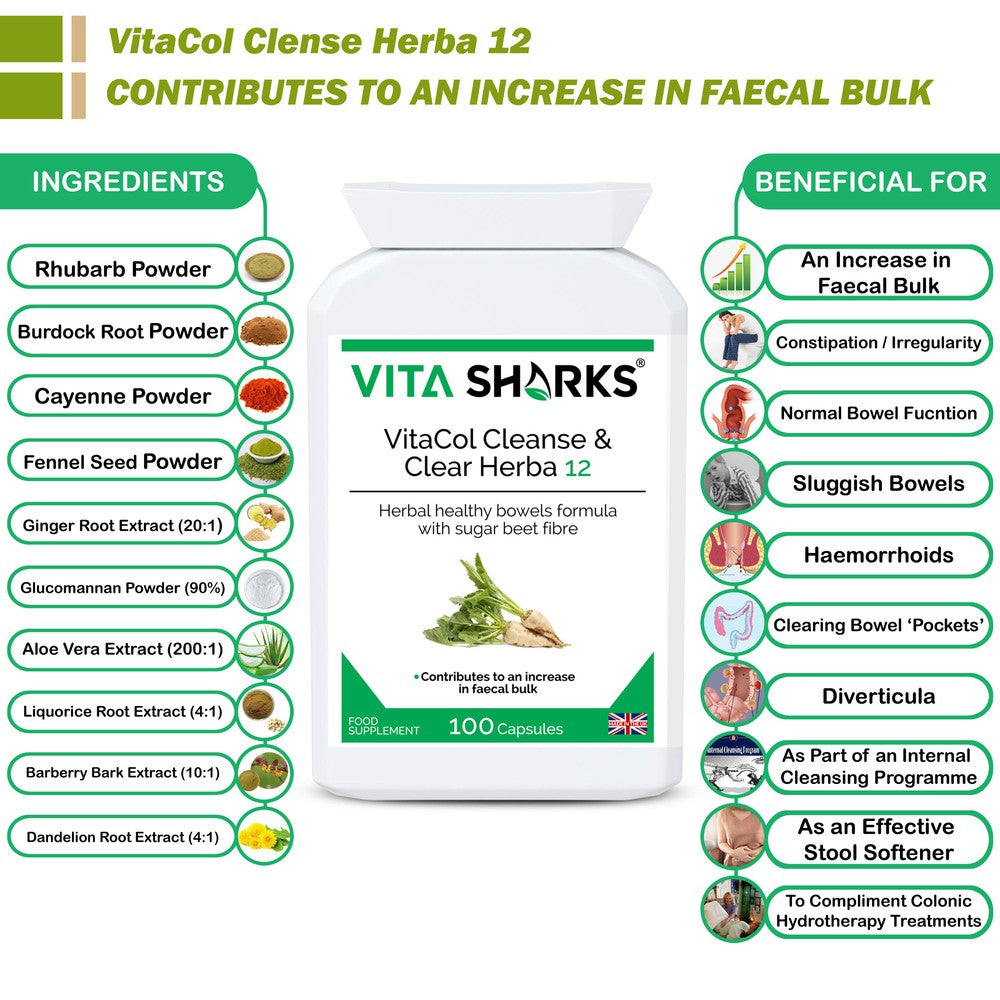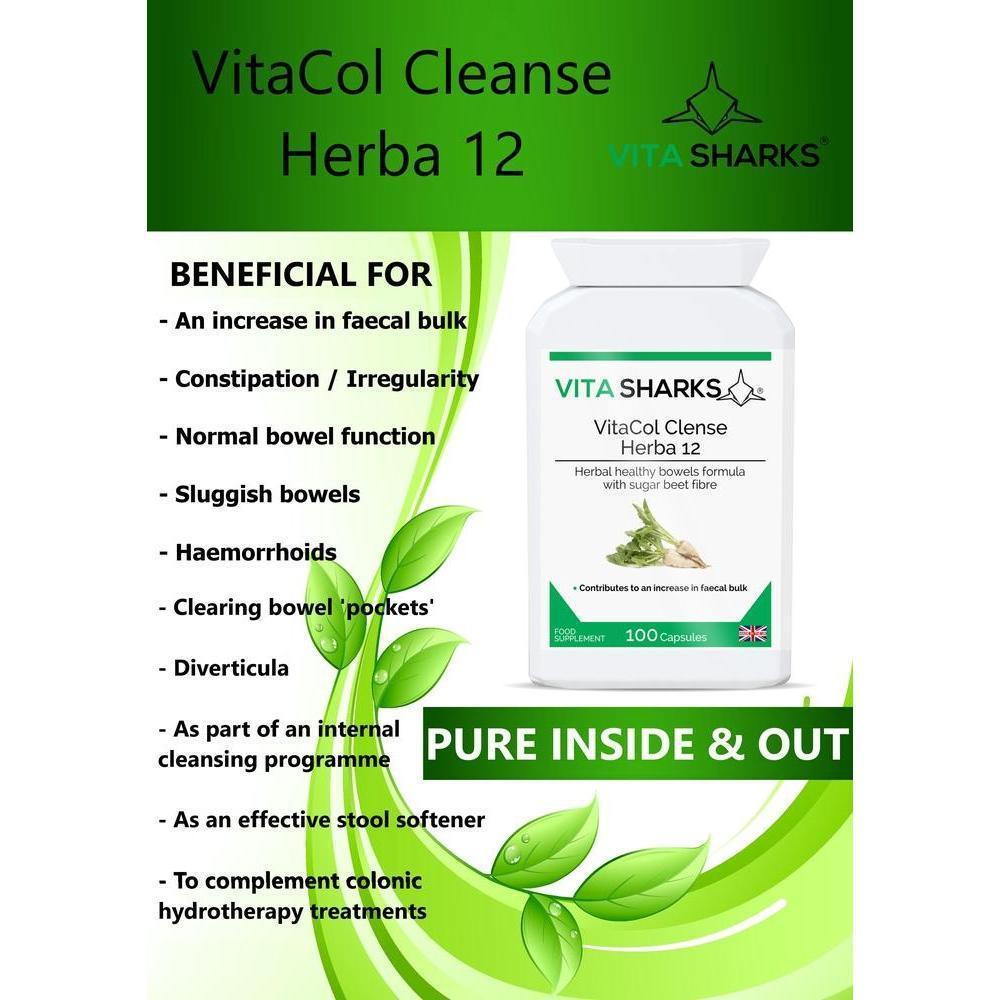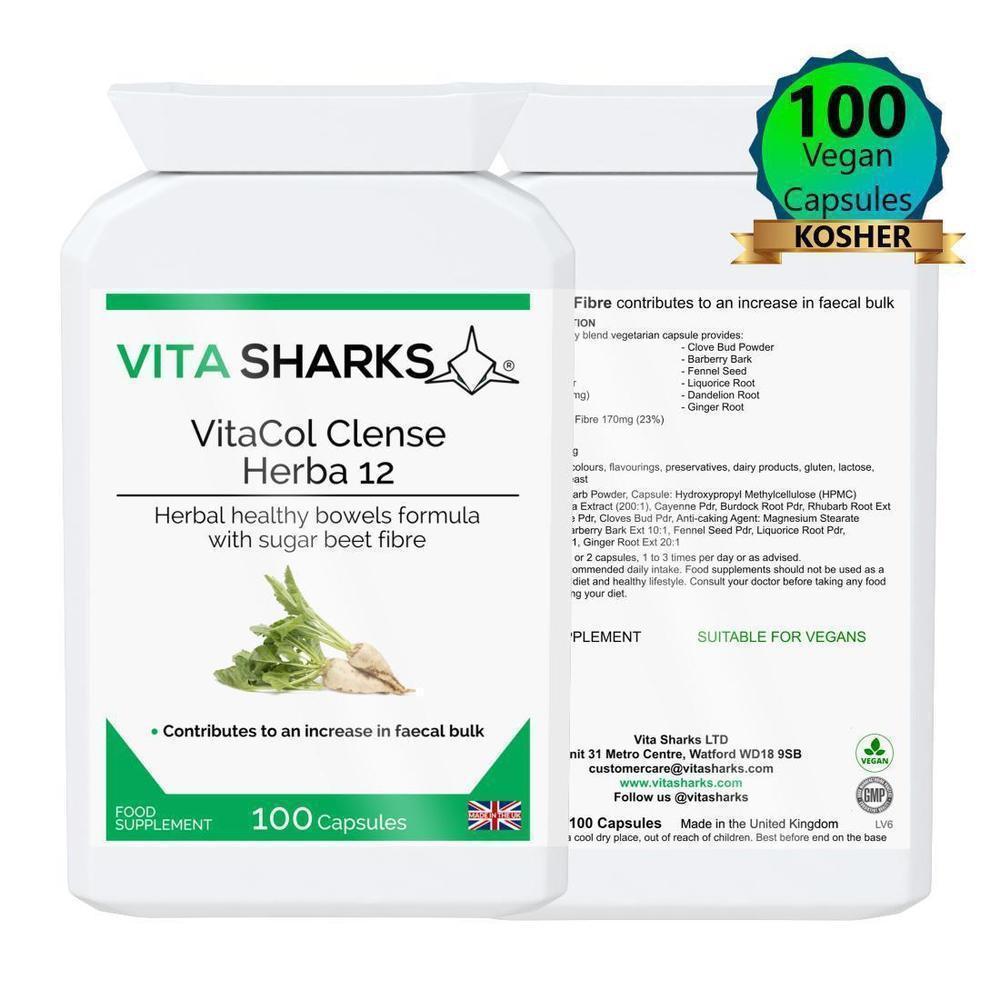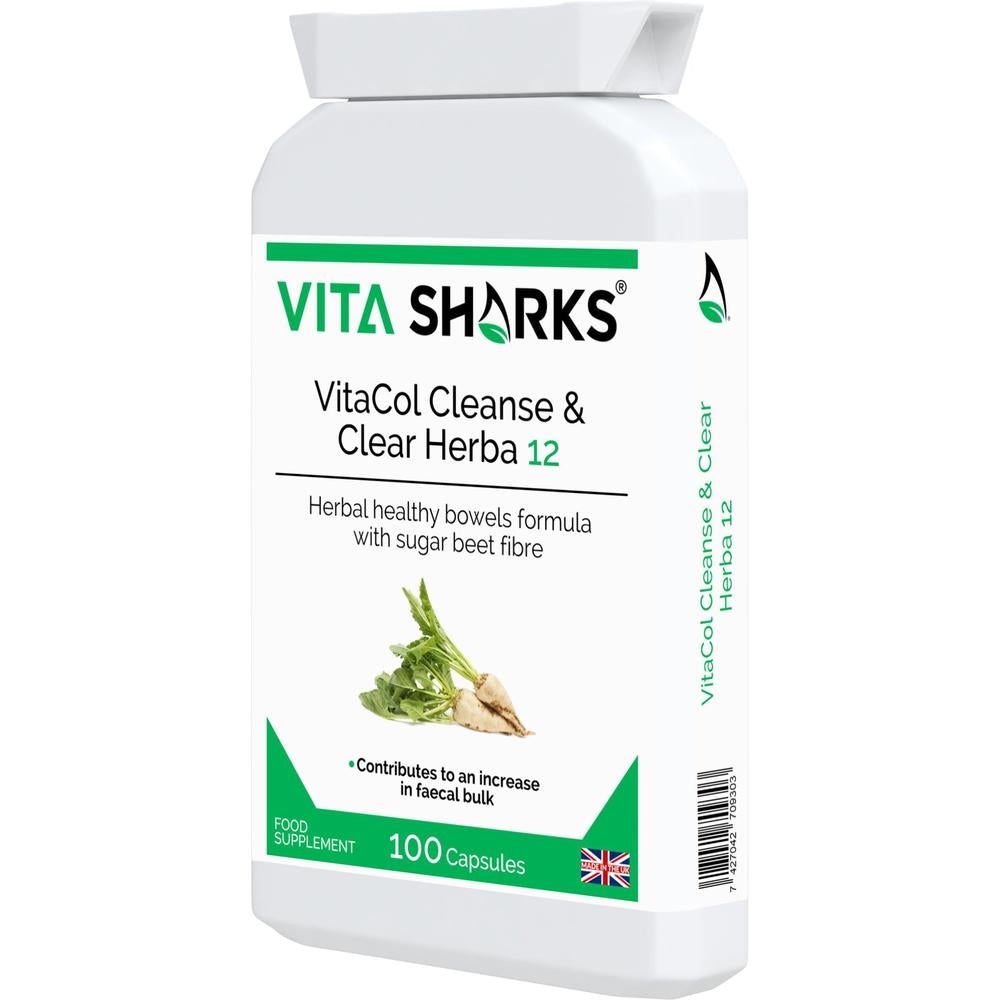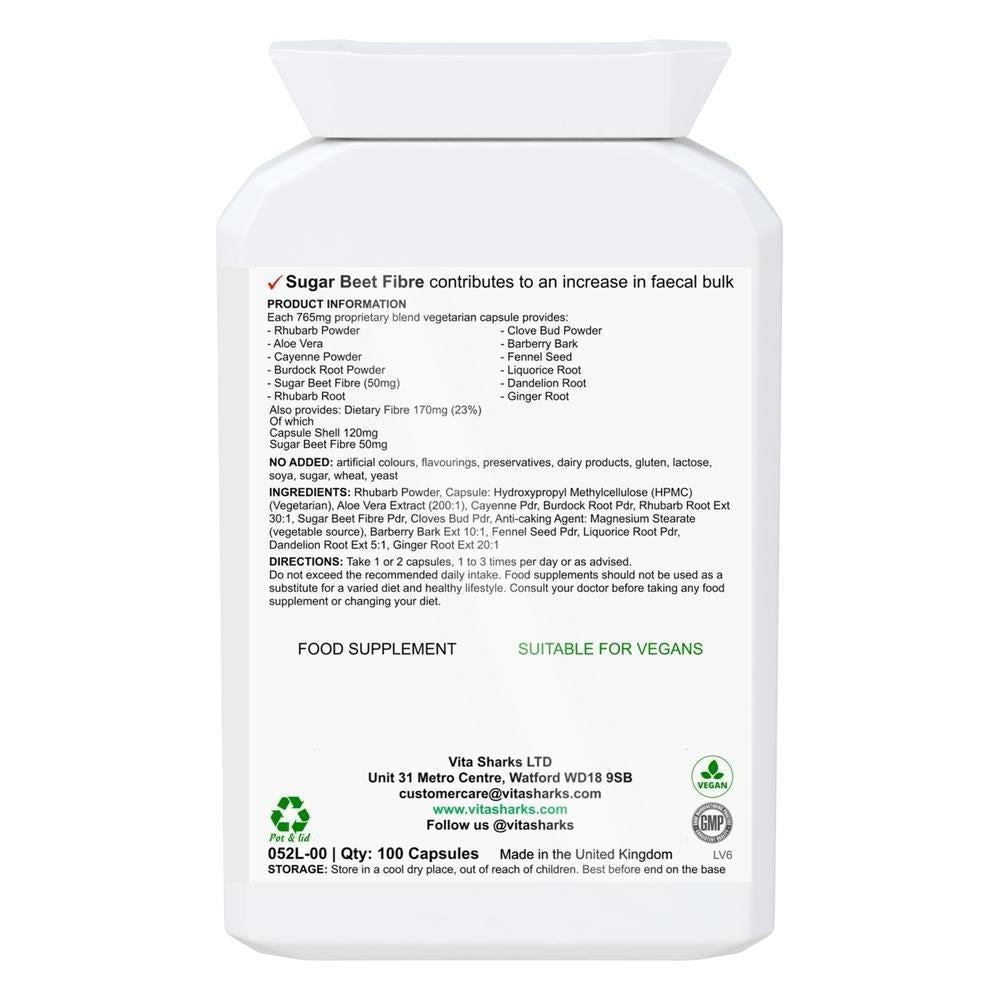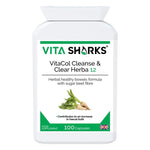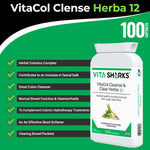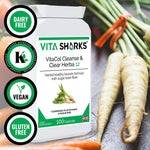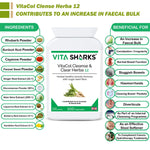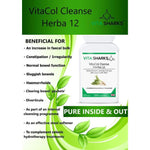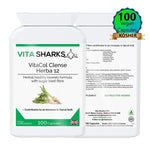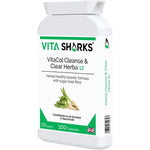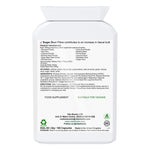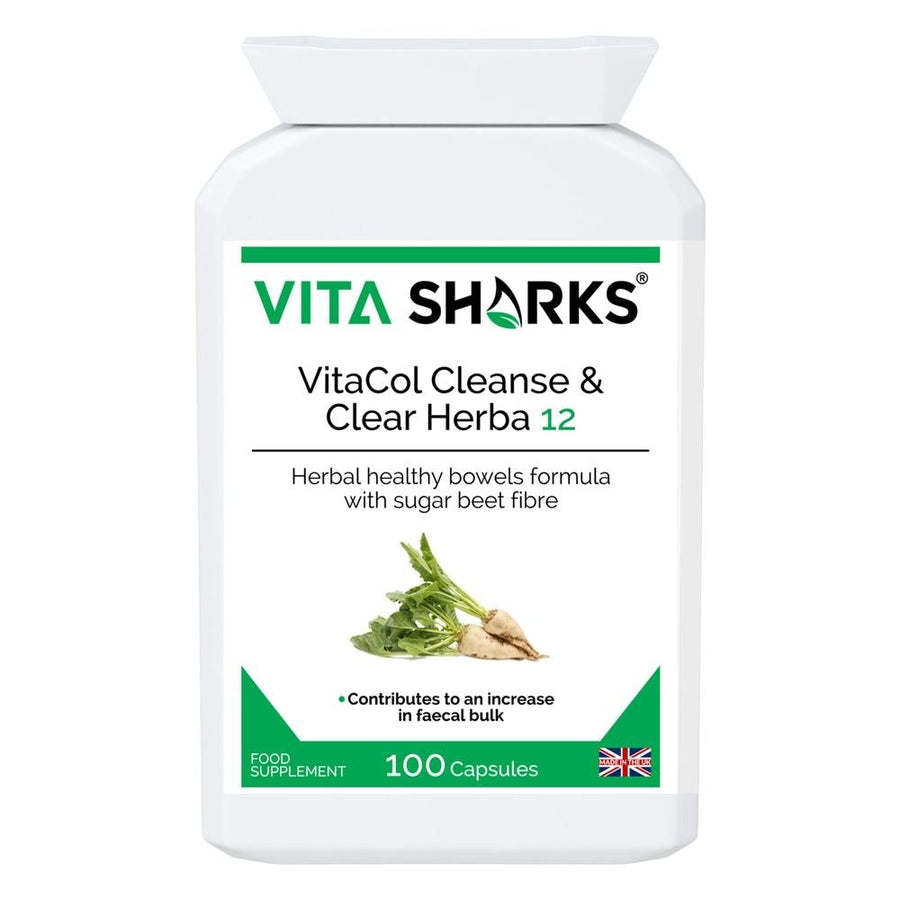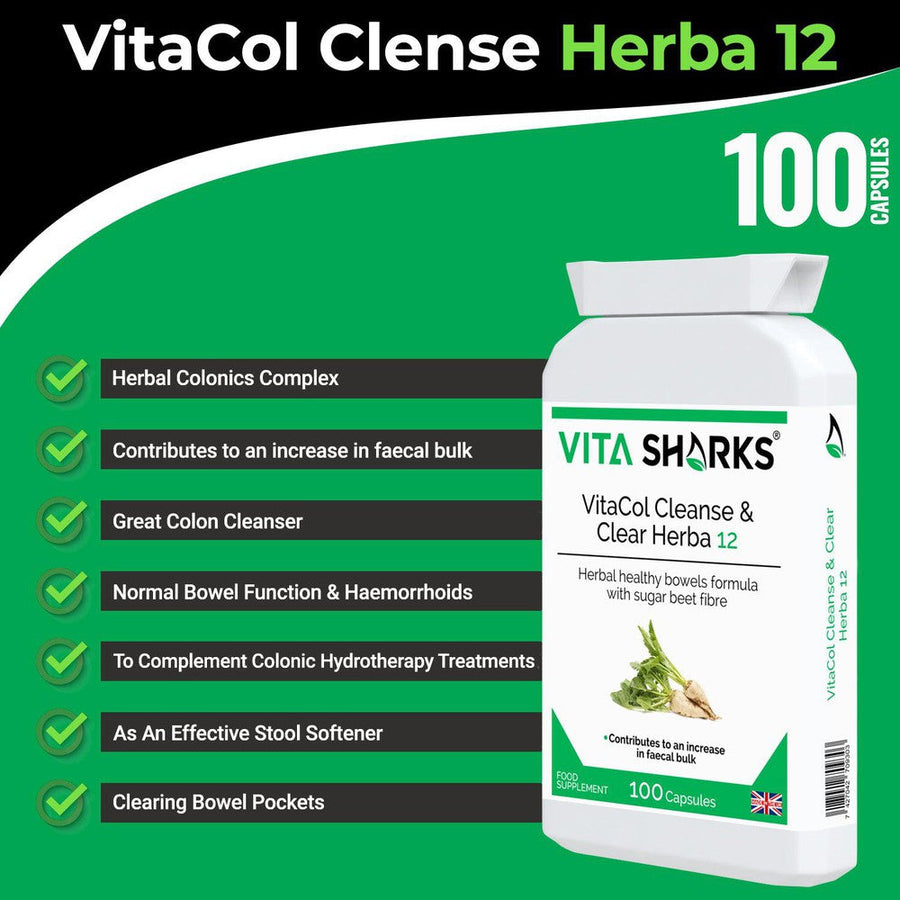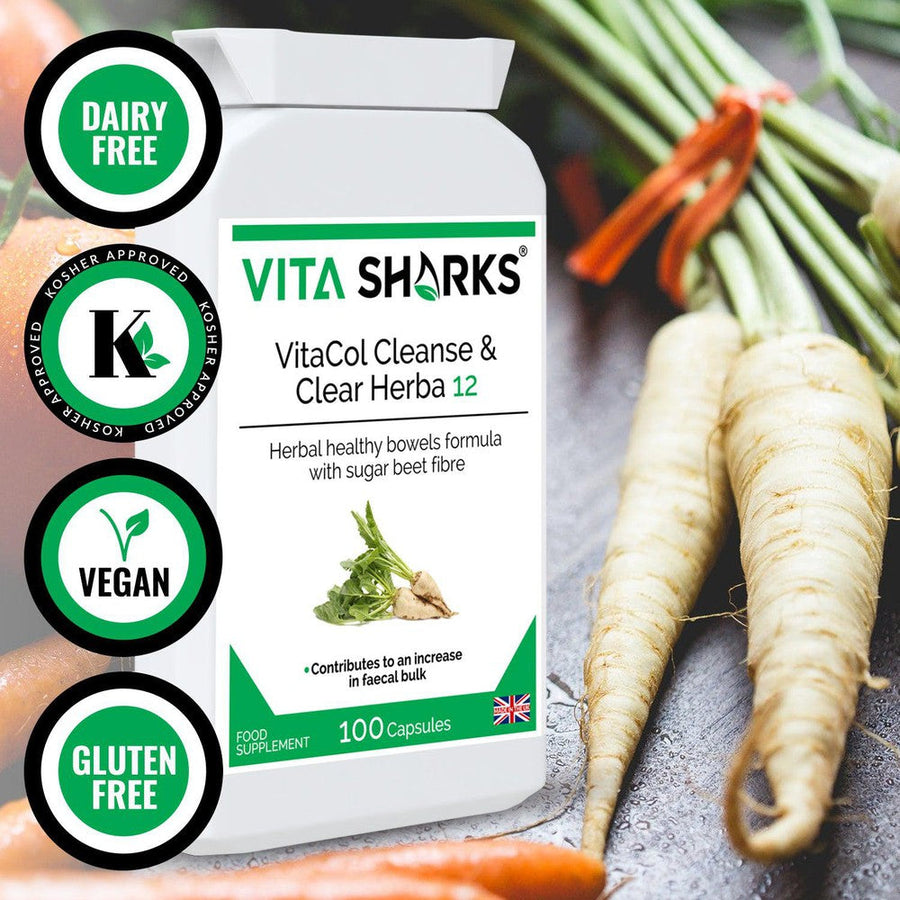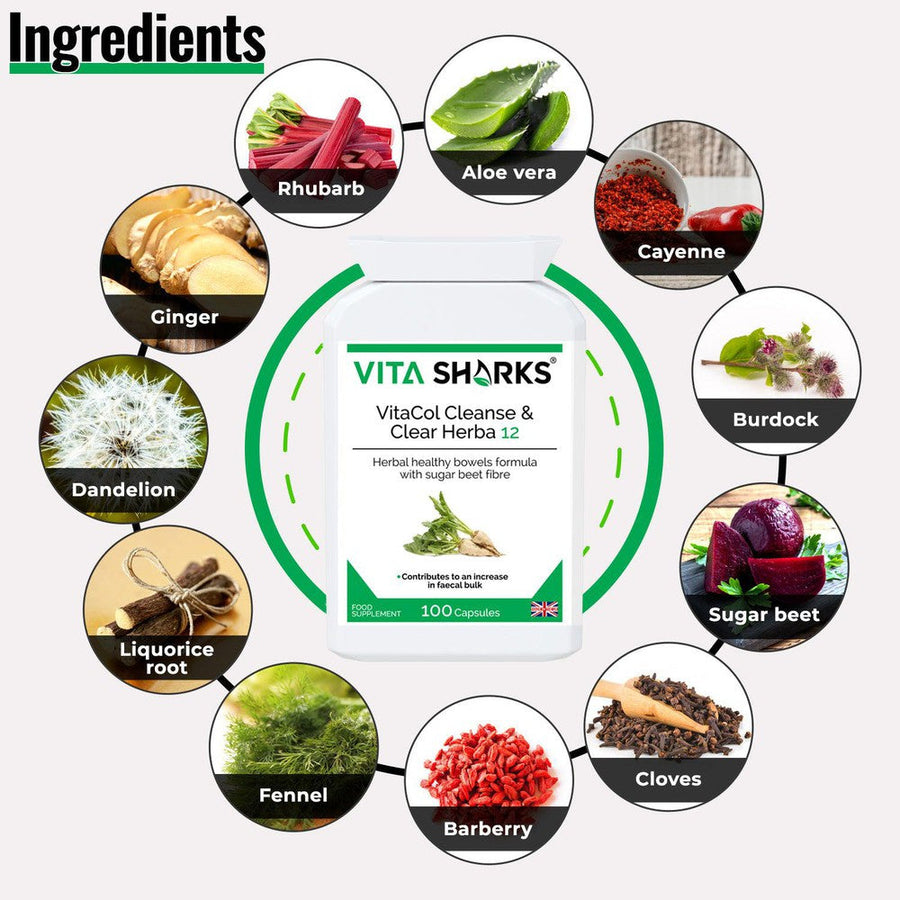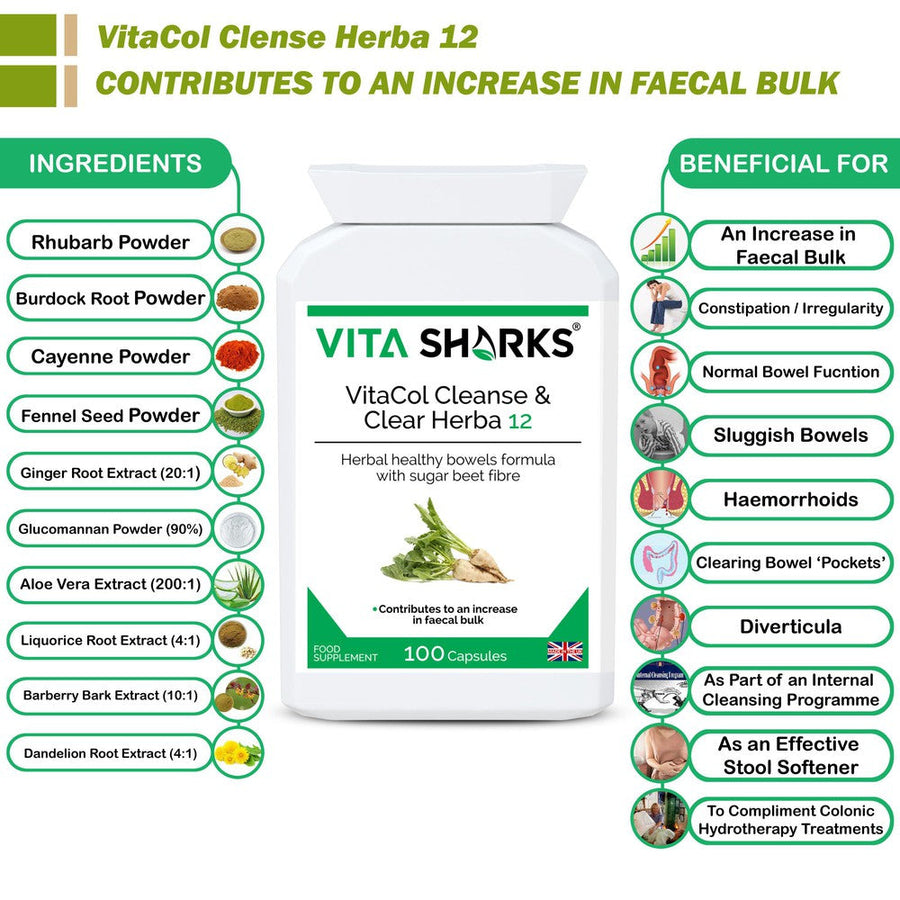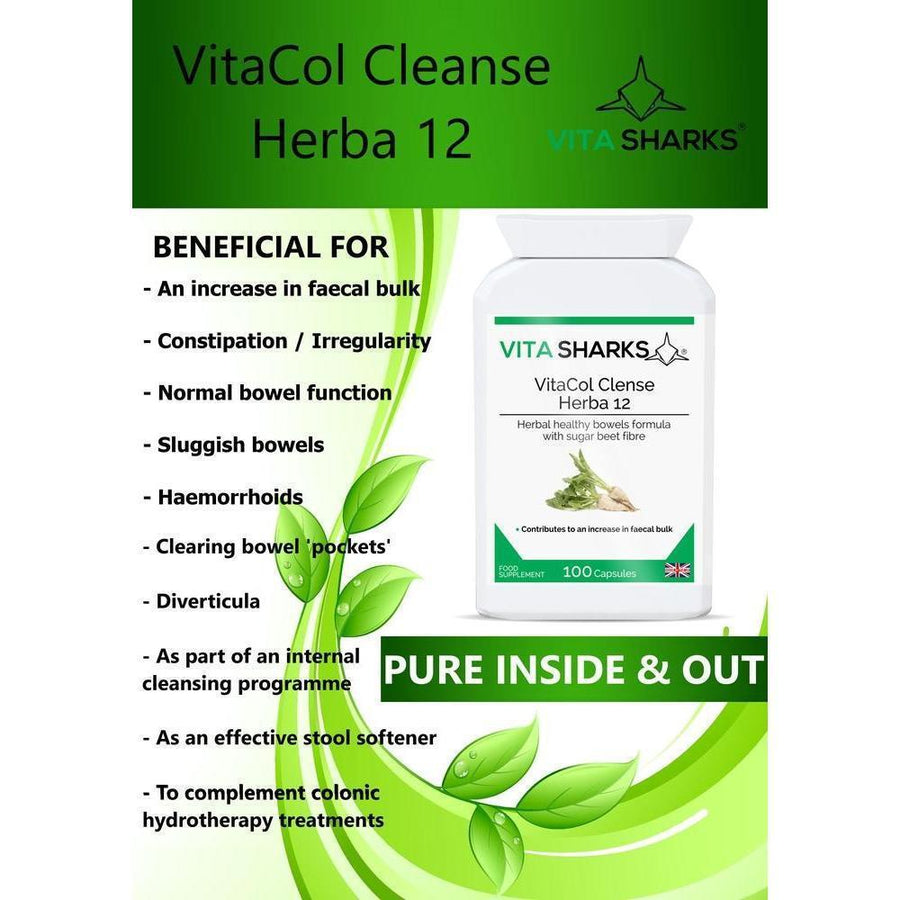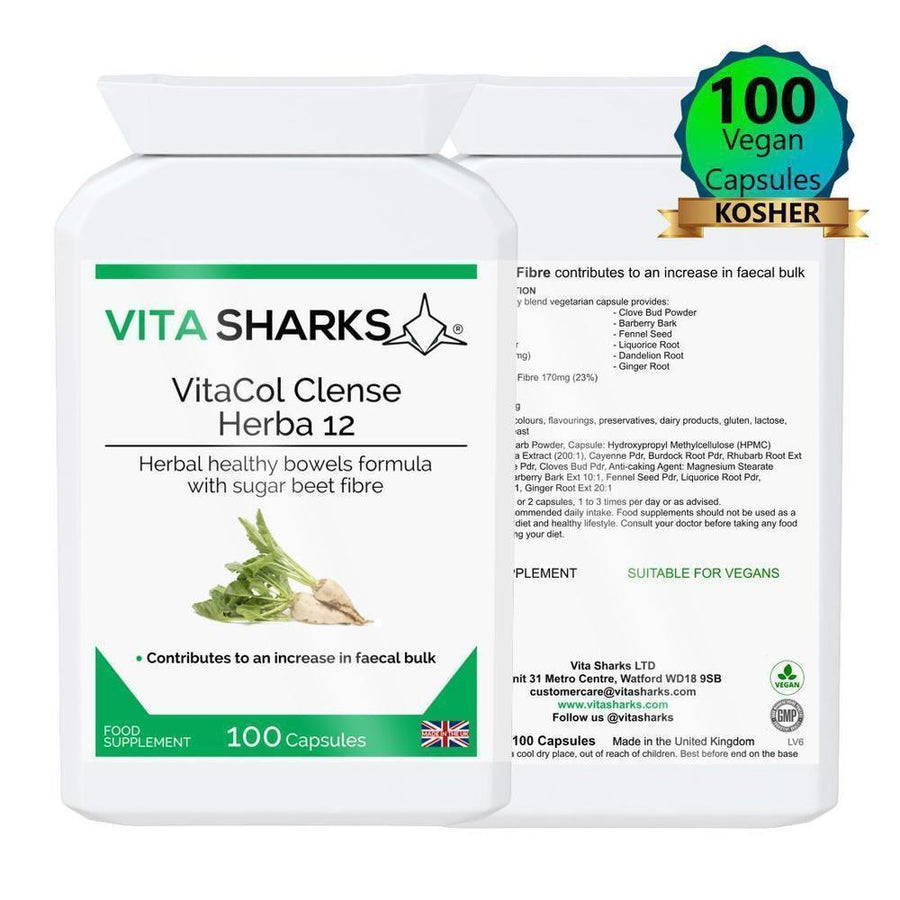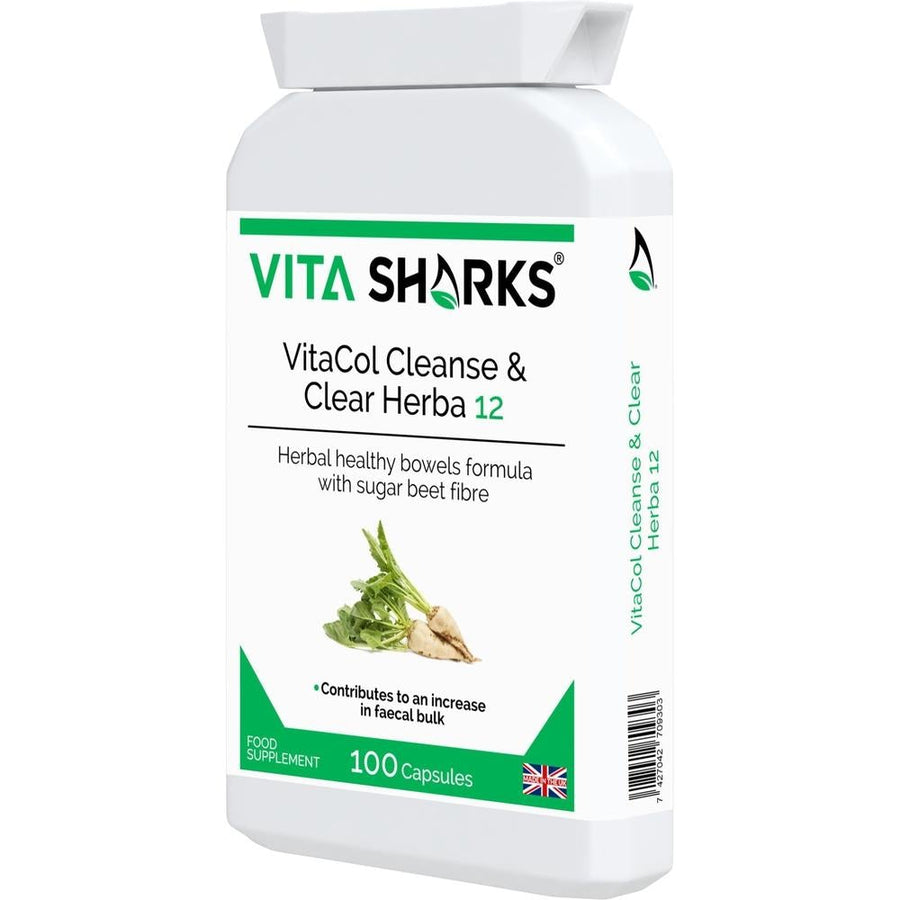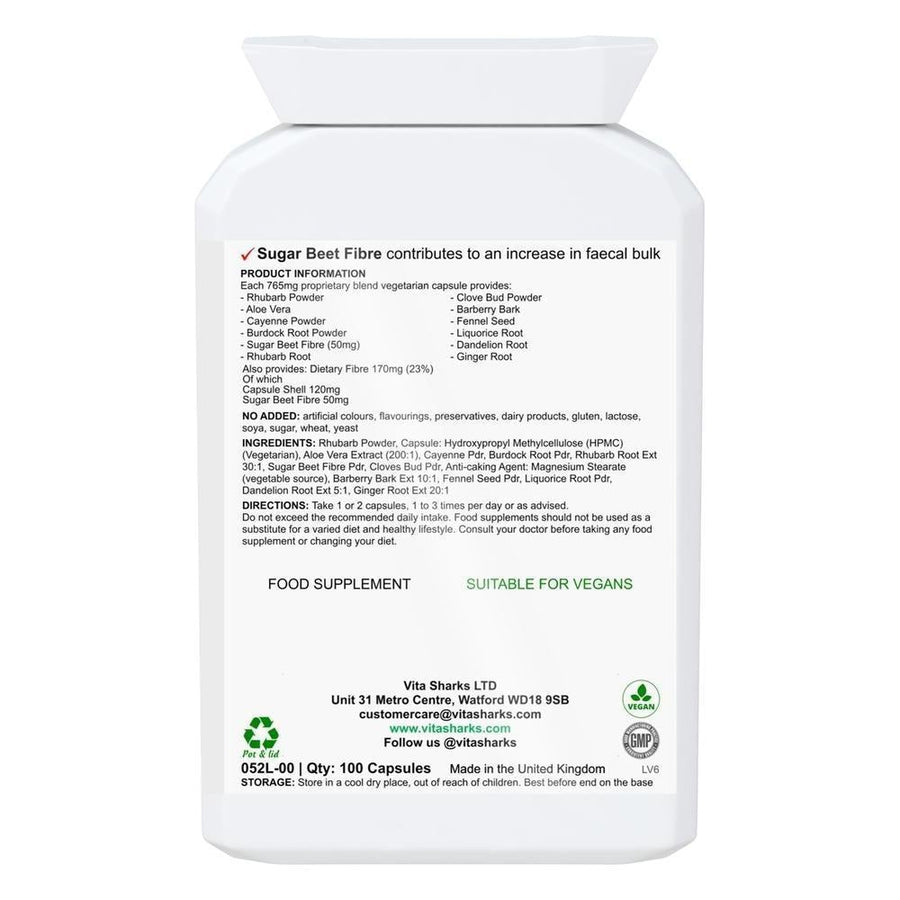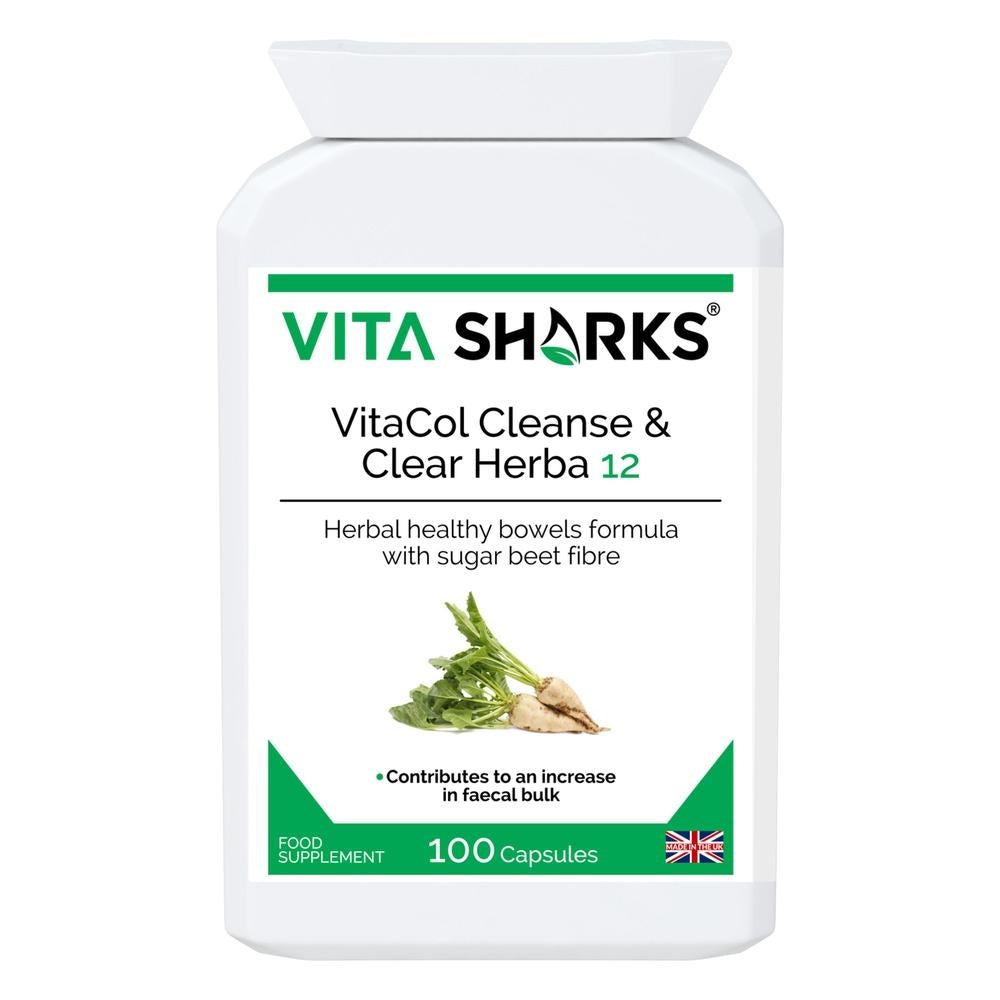
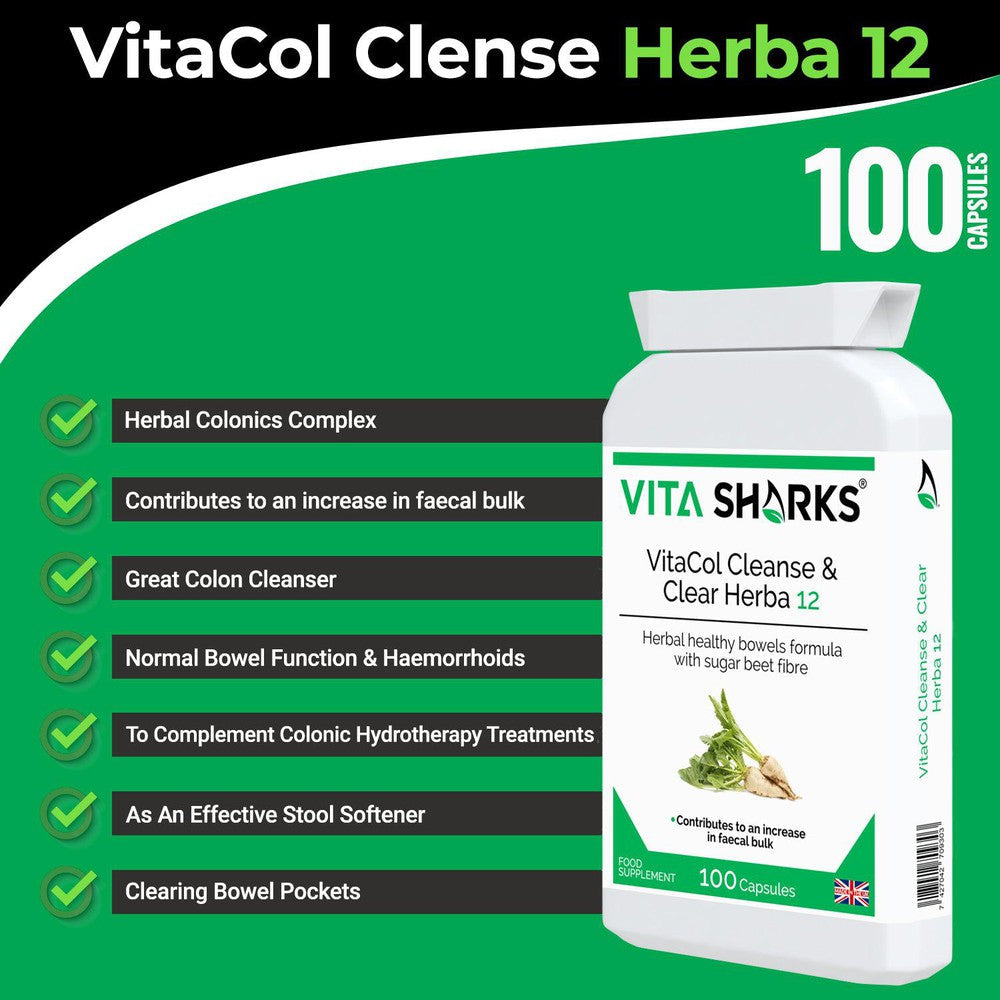
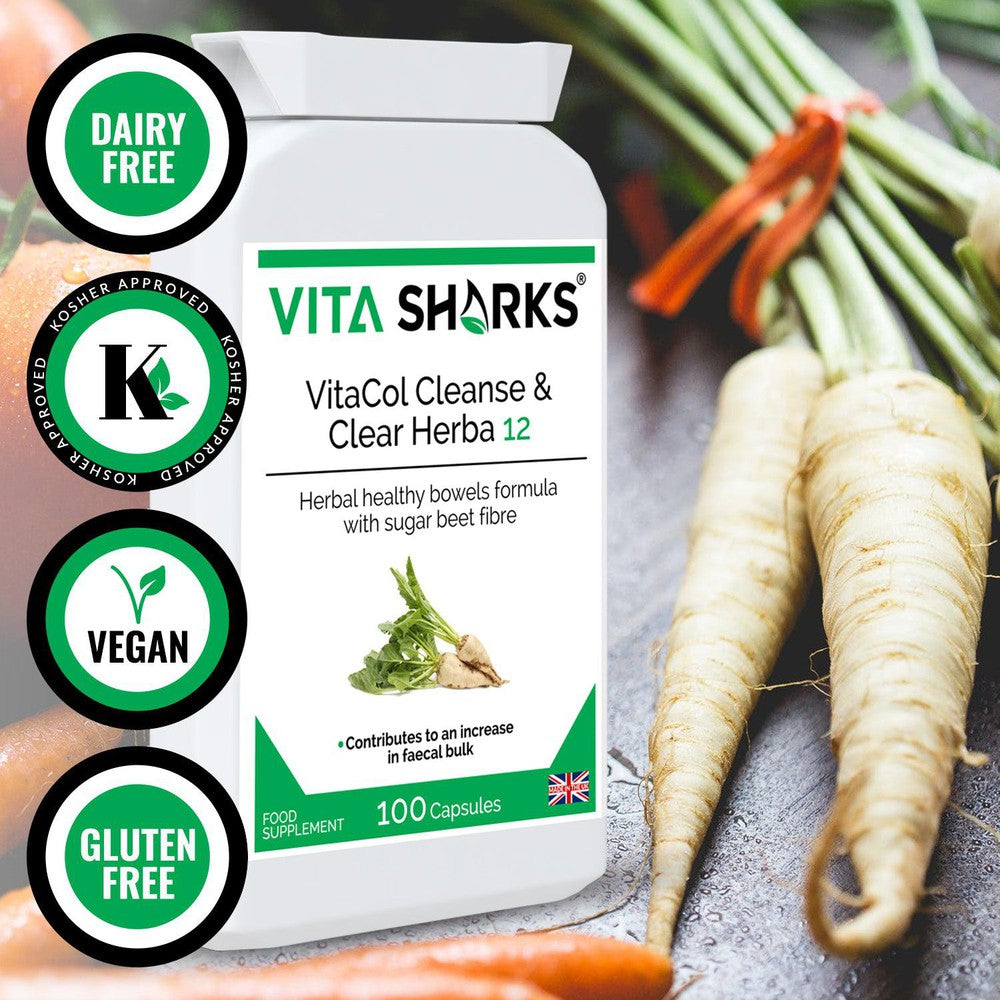
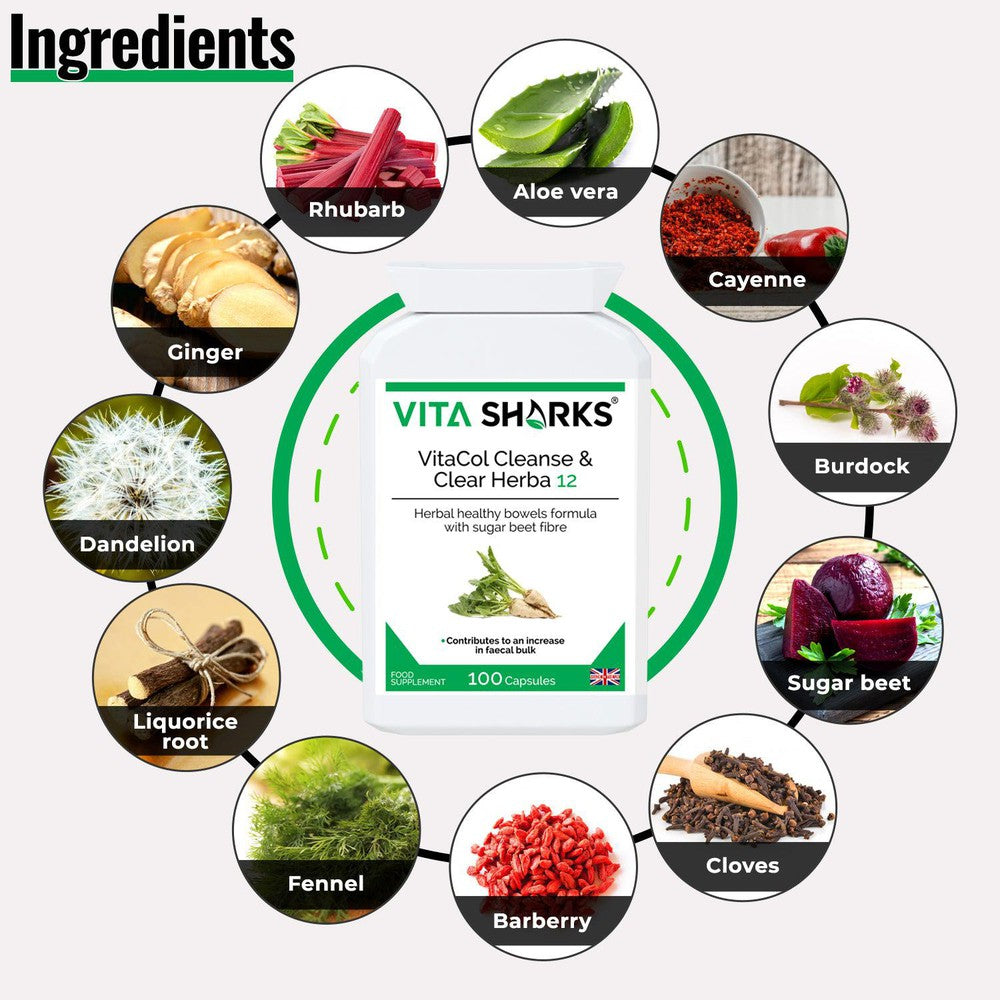
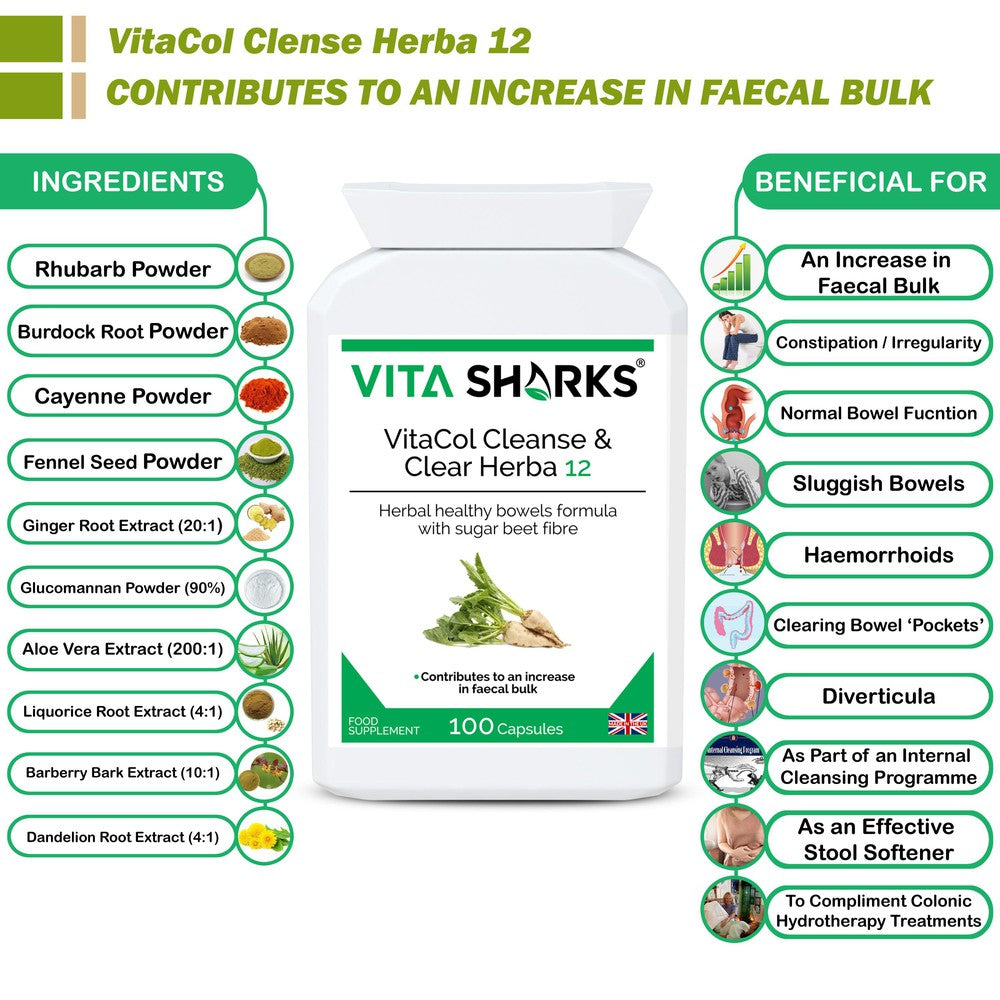
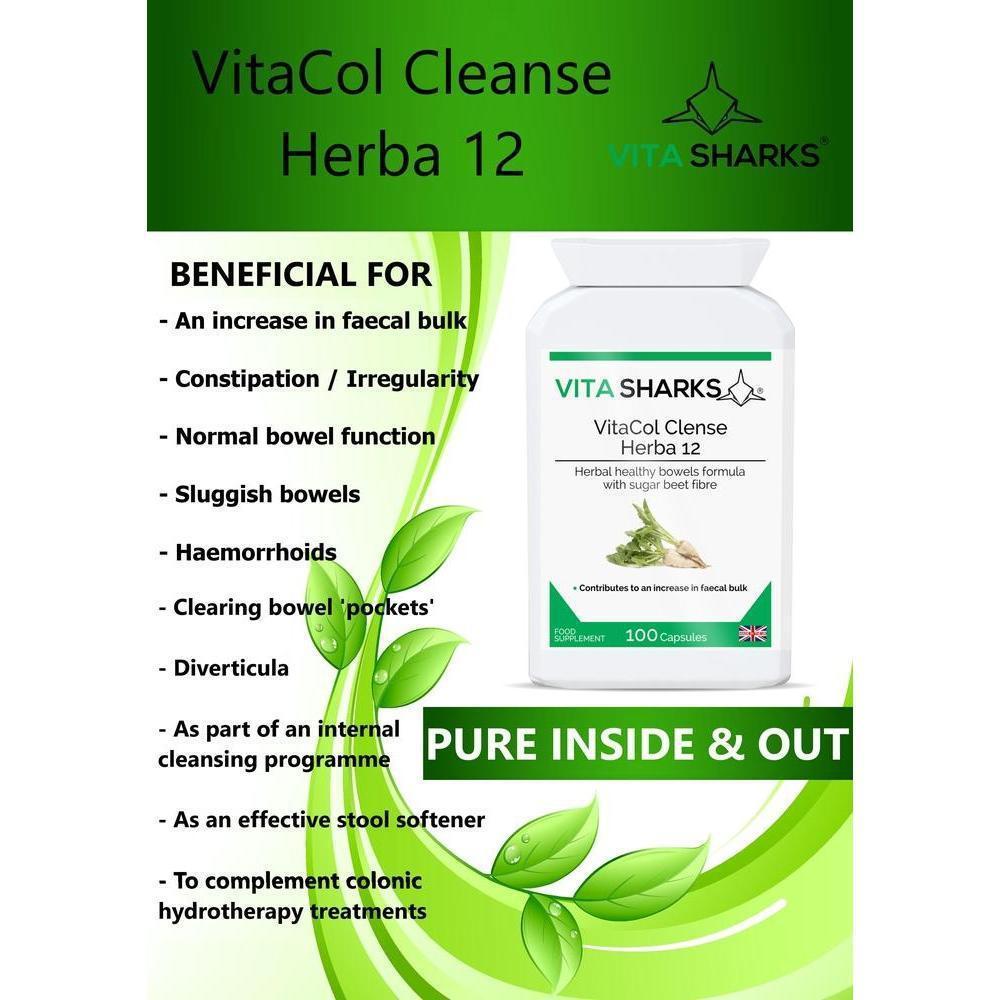
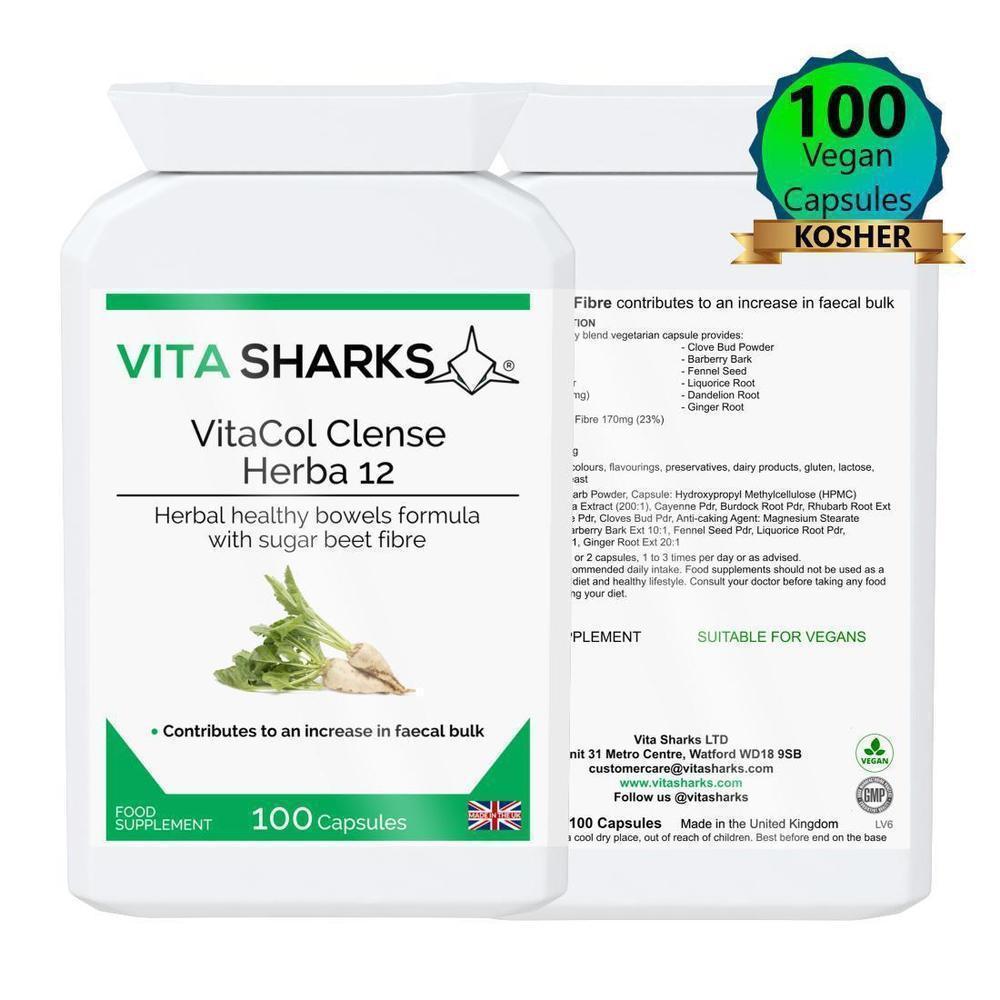
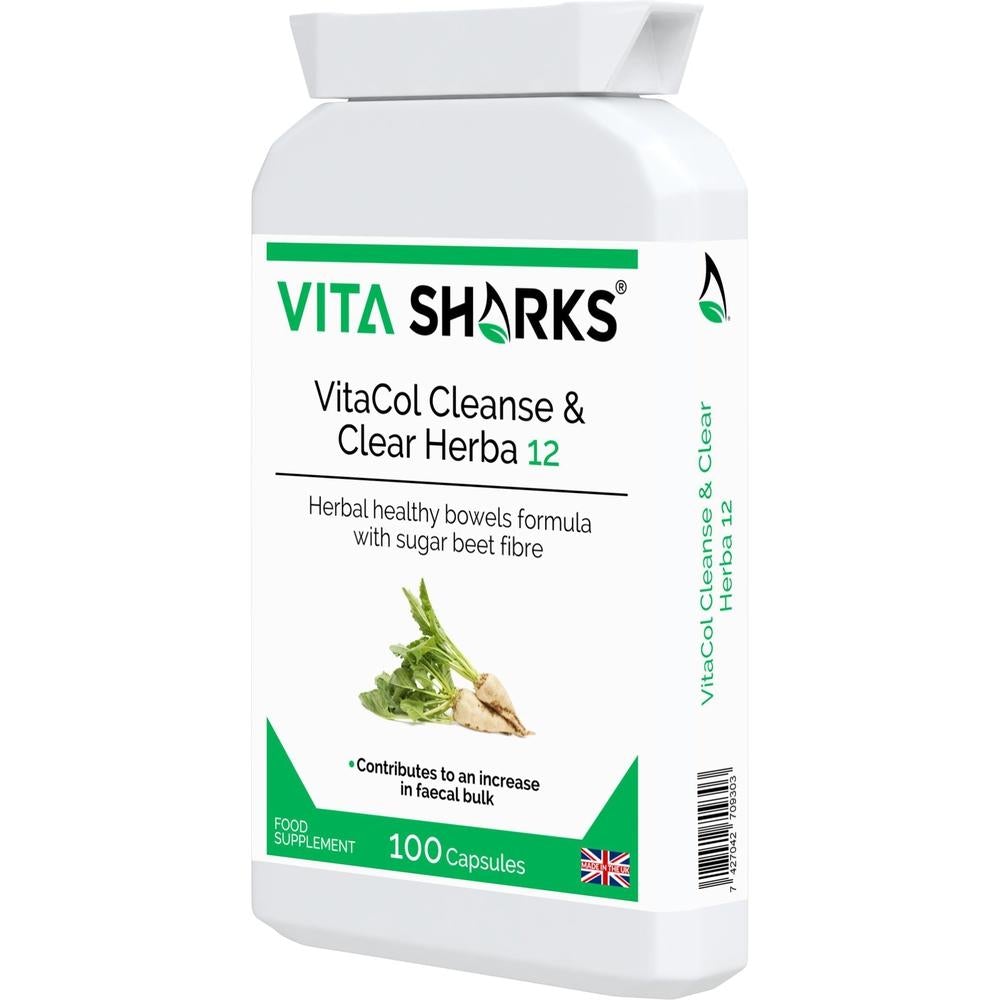
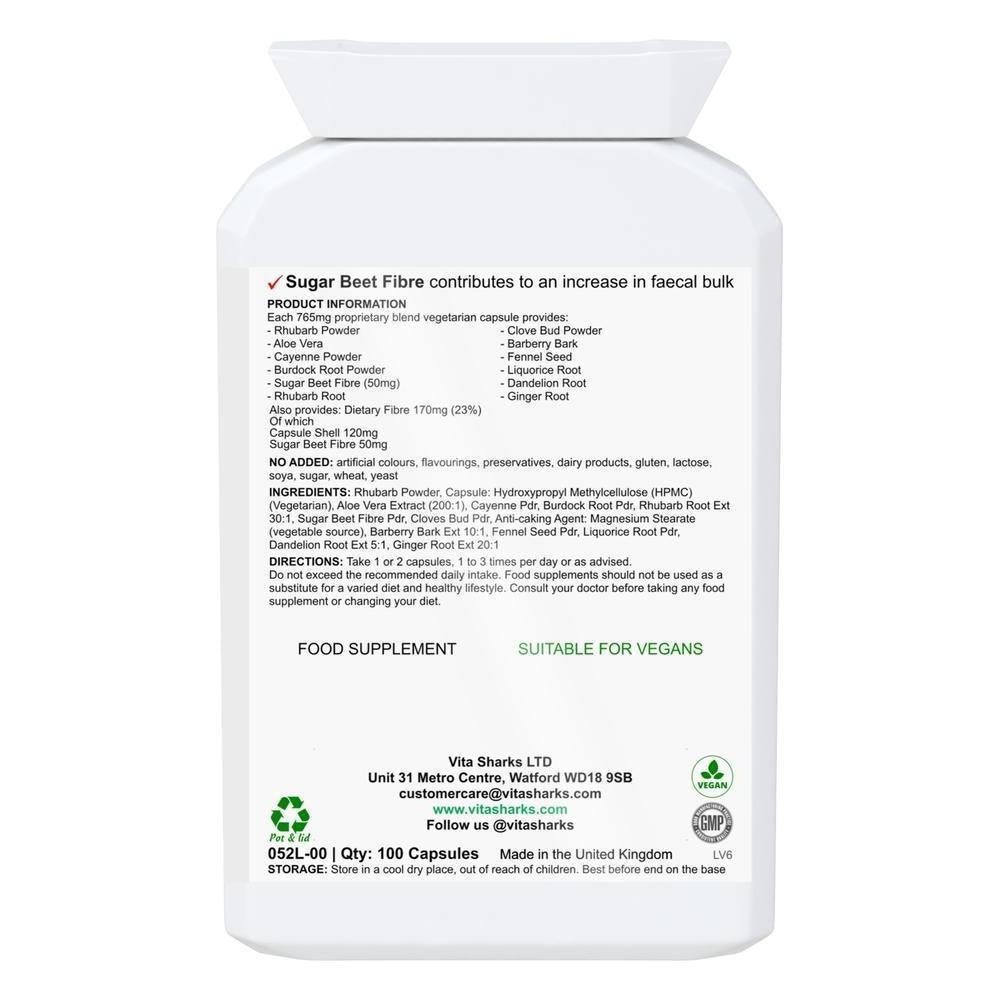
Product Information:
VitaCol Cleanse Herba 12 is a herbal colon cleanser and bowel support combination, based on a formula by master herbalist, Dr. John R. Christopher. Popular with colonic hydrotherapists, this supplement contains a range of active herbal ingredients specifically selected to contribute to an increase in faecal bulk and normal bowel function.✔ Sugar beet fibre (a source of both soluble and insoluble dietary fibre) has been included in this formulation, because it contributes to an increase in faecal bulk.
The sugar beet fibre in this formula, in particular, contributes to an increase in faecal bulk in two ways: the insoluble components of the fibre increase faecal bulk by absorbing water in the large intestine, while the soluble components are fermented by bacteria in the large intestine leading to an increase in bacterial mass. As such, this source of fibre may have a beneficial physiological effect for people who want to improve or maintain normal bowel function.
✔ A combination of 12 herbal ingredients: rhubarb powder, aloe vera, cayenne powder, burdock root powder, sugar beet fibre (50mg), rhubarb root, clove bud powder, barberry bark, fennel seed, liquorice root, dandelion root and ginger root.
The ingredients also help to cleanse the intestinal tract, soften the stool, stimulate the liver and improve peristalsis. This, in turn, helps to produce bowel movements and expel layers of old encrusted mucus and faecal matter that may have accumulated over time.
They also act to gently cleanse, stimulate and tone the bowel wall, supporting a move towards unassisted bowel movements.
-
Ingredients: Rhubarb Powder, Capsule: Hydroxypropyl Methylcellulose (HPMC) (Vegetarian), Aloe Vera Extract (200:1), Cayenne Pdr, Burdock Root Pdr, Rhubarb Root Ext 30:1, Sugar Beet Fibre Pdr, Cloves Bud Pdr, Anti-caking Agent: Magnesium Stearate (vegetable source), Barberry Bark Ext 10:1, Fennel Seed Pdr, Liquorice Root Pdr, Dandelion Root Ext 5:1, Ginger Root Ext 20:1
Directions: 1 or 2 capsules to be taken 1 to 3 times per day or as advised.
-
Warning: This product should be used in conjunction with improved dietary habits, increased water intake and a sensible exercise regime.
Legal Disclaimer
Always read the product directions before use. Do not exceed the recommended intake. As with other food supplements seek professional advice before using if you are pregnant, breastfeeding or suffer from food allergies, and consult your doctor or pharmacist if you have an underlying medical condition. Vitamin supplements are not intended to treat or prevent any disease. Food supplements must not replace a balanced and varied diet, and a healthy lifestyle.
Contains no added: artificial colours, flavourings, preservatives, dairy products, gluten, lactose, soya, sugar, wheat or yeast.
More about the ingredients:
Turkey rhubarb, technically referred to as Rheum palmatum, is widely used as part of colon cleansing programmes, because it contains the following active ingredients: anthraquinones, emodin, tannins, flavonoids (including rutin) and several polyphenols. Rhubarb is a strong herbal laxative, astringent-bitter, gastric stimulant, anti-inflammatory, stomach tonic and antiseptic. It is also used for disorders of the liver, gallbladder and stomach.
Aloe vera (Aloe barbadensis and others) is a spiky, cactus-like plant of the lily family, best known for its soothing and calming properties. As well as containing 18 amino acids and vitamins (it is a vitamin B12 precursor), it also supports a lower toxic load, acts as an antioxidant and supports intestinal integrity and natural cleansing.
Cayenne is a ‘hot’ herb and chilli pepper is also known as Capsium frutescens. It is rich in vitamins A, B6, C, E, riboflavin, potassium and manganese. It also contains the active ingredient capsaicin, which supports healthy blood flow (and therefore natural detox), a healthy metabolism, digestion, gastrointestinal secretions and acts as an anti-spasmodic for relief of pain and as a carminative
Burdock, technically referred to as Arctium lappa, is one of the most potent tonics of herbalism. It contains a broad spectrum of nutrients, including fatty acids, organic acids, phenolic acids, lignans, sesquiterpenes, tannin, mucilage and inulin (a prebiotic), along with iron, sulphur and B-vitamins. It is widely used to support liver function and as a cleansing botanical.
Sugar beet fibre as been included in the formula because it has been scientifically proven to contribute to an increase in faecal bulk in two ways: the insoluble components of the fibre increase faecal bulk by absorbing water in the large intestine, while the soluble components are fermented by bacteria in the large intestine leading to an increase in bacterial mass. As such, this source of fibre may have a beneficial physiological effect for people who want to improve or maintain a normal bowel function.
Cloves are a fragrant spice, with oil being distilled from the buds. Its active constituents include a heavy volatile oil, a camphor resin, flavonoids and sterols. It is a natural anti-septic, known to support digestion.
Barberry, also known as berberis vulgaris, is a natural helper for digestive complaintsand also supports the liver, gallbladder and spleen. Its active ingredients are the isoquinolone alkaloids, particularly berberine. It also has an antiseptic and anti-bacterial effect when taken orally, useful against dysbiosis. Stimulates bile flow, eases liver congestion and is ideal for an inflamed gallbladder and intestinal inflammation.
Fennel, technically referred to as Foeniculum vulgare, has traditionally been used as a culinary herb because of its aroma and anise-type flavour, but it has also become a popular component of colon cleansing programmes because it supports the body’s natural elimination of excess waste and toxins from the colon and a healthy acid/alkaline balance. It is also a gentle digestive and carminative herb, used to counteract flatulence, disperse windy colic and alleviate intestinal spasms, griping and irritable bowel.
Liquorice root stimulates the production of digestive fluids and bile, soothes ulcers, helps reduce intestinal inflammation, and supports the healthy function of the kidneys, liver and bladder. Its action in soothing ulcers is unique. Rather than inhibit the release of acid, licorice stimulates the normal defense mechanisms that prevent ulcer formation. Specifically, licorice improves both the quality and quantity of the protective substances that line the intestinal tract; increases the life span of the intestinal cell; and improves blood supply to the intestinal lining.
Dandelion, technically referred to as T. officinale and T. erythrospermum (the two species), is a rich source of vitamins A, C, D and B complex vitamins, as well as minerals such as iron, potassium, and zinc. It has traditionally been used to support healthy fluid balance in the body and as a natural helper for the stomach and digestive system. It also provides support for the liver and gallbladder, by helping to clear toxins. The root is a bitter tonic and ancreatic regulator, which also offers spleen support and promotes bile flow.
Ginger, technically referred to as zinigiber officianale, has been used for centuries to support a healthy gastrointestinal tract and efficient digestion. It alleviates occasional gas, bloating and nausea and is known as a 'hot bitter' herb which promotes gastric acidity. It is used for many stomach conditions and has anti-inflammatory, carminative, anti-spasmodic, expectorant, vasodilator and circulatory stimulant actions. Gingerol, a compound in ginger, is also a powerful antioxidant.
SKU:

